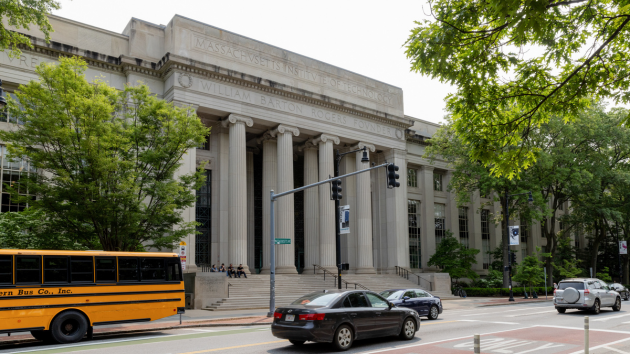Healthy food benefits for women, infants and children in limbo during government shutdown
Written by ABC Audio. All rights reserved. on October 2, 2025
(NEW YORK)– Sarah Manasrah has received aid from the Supplemental Nutrition Program for Women, Infants, and Children — commonly known as WIC — since her first child was born six years ago.
The 37-year-old mother who lives with her husband and two girls, who are 6 and 3 years old, in Brooklyn, New York, told ABC News in an interview on Wednesday that she didn’t even know that the federal government shutdown could possibly affect WIC benefits — which supplements nutritious foods for low-income families — for her and her children.
“They do not care about families. They say they do to push through their political agenda,” Manasrah said of Republican and Democratic members of Congress, who failed to reach an agreement to fund the government, effectively shutting it down on Wednesday.
Manasrah said she uses WIC benefits to provide about $27 for fresh fruits and vegetables, and allowances for a certain amount of specified nutritious foods like eggs, whole-wheat bread, milk and baby formula free of charge using a government-provided expense card that replenishes once a month.
The mother of two also used WIC’s breast-feeding support program through a peer counselor who assisted her with her first child.
How will the shutdown impact WIC?
Experts told ABC News that they were unsure of the exact impacts a shutdown will have on WIC beneficiaries, since individual states will each have to decide if they can supplement the funds, and the amounts can vary depending on the state.
Ali Hard, director of public policy for the National WIC Association, told ABC News on Tuesday that WIC recipients may start to see their benefits impacted after the first or second week of the shutdown.
She said that WIC has $150 million in contingency funding in the event of a shutdown and $135 million in monthly baby formula rebate checks that would help the program run smoothly for about a week or two.
After that, both new and current WIC beneficiaries will start to see their benefits impacted, especially those in areas without state funds to supplement the loss of federal dollars, Hard said.
“The timing of this shutdown at the start of the new fiscal year puts WIC at risk of rapidly running out of funds,” Hard’s group said in a statement released on Tuesday. “This failure needlessly jeopardizes the health and nutrition of millions of pregnant women, new mothers, infants, and young children who rely on WIC. … Every day of inaction brings us closer to a crisis. Failure to rapidly reopen the government could result in State WIC directors being put in the horrible position of trying to manage their programs with insufficient funds.”
With the federal government shuttered, some states will have to dip into their own coffers to pay for WIC benefits.
Democratic Reps. Bobby Scott and Suzanne Bonamici sent a letter on Wednesday to U.S. Agriculture Secretary Brooke Rollins, whose department oversees the WIC program, urging the secretary to lay out a plan on how the department plans to replenish state funds used to supplement WIC benefits once the shutdown is over.
“The WIC program serves as a lifeline for families; the program’s caseload increased by 5 percent in Fiscal Year 2023 from 6.4 million participants to 6.7 million, underscoring the need to fully fund the program each year without delay or uncertainty,” the representatives stated in their letter.
In 2013, during a 16-day government shutdown, “states relied on their general funds to continue WIC services and were then reimbursed with federal funds once the shutdown was over; however, there is uncertainty over whether the federal government would take the same action this time,” the letter stated.
A spokesperson with the USDA sent ABC News a letter from the department, was dated Oct, 1, 2025, and addressed to directors of the Supplemental Nutrition Division in all regions saying that state agencies could pull funding from rebates, state-appropriated or general funds, and contingency funds. But they were not permitted to use any extra FY 2025 funds for FY 2026 costs, according to the letter.
“Nutrition programs will operate based on State choice and the length of a shutdown,” the USDA spokesperson said in a statement to ABC News Wednesday. “If Democrats do not fund the government, the Special Supplemental Nutrition Program for Women, Infants, and Children (WIC) will run out of funding and States will have to make a choice.”
A spokesperson with the White House’s Office of Management and Budget also lay the blame on Democrats.
“By instigating a government shutdown, Democrats are turning their back on WIC recipients,” an OMB spokesperson said in a statement. “The program will run out of money in October and women and children could no longer receive benefits. The White House and Republicans in the House-passed CR added $600 million so there will be no loss of benefits–clearly Democrats are ok with women and children losing WIC benefits.”
Democrats have blamed Republicans for the shutdown, citing what they say is an unwillingness to negotiate over health care provisions.
President Donald Trump’s administration has made notable attempts to promote families and reiterated that more babies need to be born in the United States.
According to the Trump administration’s Make America Healthy Again Report, WIC provides exclusively nutritious foods for pregnant and breastfeeding women, women who recently had a baby, and infants and children up to 5 years old. WIC supplies nutrition education and support for approximately 6.7 million women and children nationwide, according to the MAHA Report.
“WIC has a proven track record of improving children’s health,” according to the MAHA Report. “Research has shown that recipients experience improved pregnancy outcomes, better birth weights, higher immunization rates, improved diet quality, and cognitive gains. … A study showed the 2009 WIC food package change may have helped reverse increasing childhood obesity rates.”
Manasrah, the Brooklyn mother of two, is a doula who supports pregnant women before birth and provides them post-partum assistance. She also works for the non-profit Bridge Project that gives money and assistance to low-income mothers during pregnancy, birth, and the earliest days of their babies’ lives.
She says a vast majority of the women she works with receive WIC benefits.
“Most families I know, rely on WIC for their formula, if they’re using formula, and that’s literally keeping babies alive,” Manasrah said. “So, it’s not an exaggeration to say that WIC is a lifesaving program for families.”
Copyright © 2025, ABC Audio. All rights reserved.





